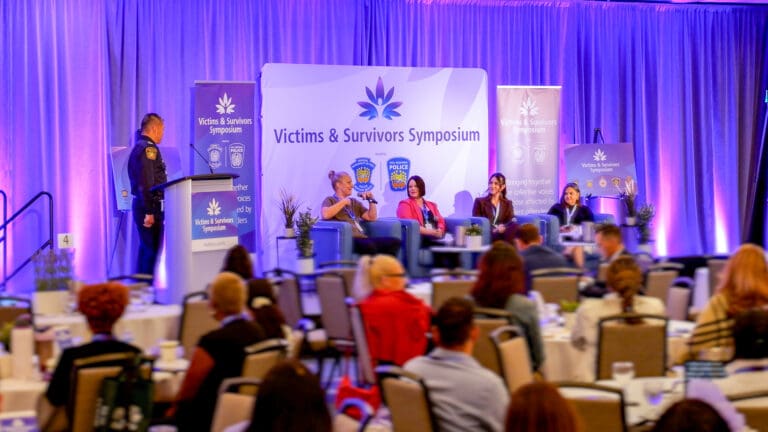Peel Regional Police and the Peel Police Service Board hosted Ontario’s first policing-led Victims and Survivors Symposium, bringing together victims, survivors, community partners, and police services to address the impacts of violent crime and repeat offenders, highlight systemic gaps, and call for change.
As part of the symposium, the Chiefs of Police from Peel, Durham, Halton, and York released recommendations to strengthen bail reform, improve access to supports for victims and survivors, and advance legislative changes to address violent crimes and reduce harm.
The recommendations, shaped by the voices of victims and survivors and informed by collaboration with community partners, are available online.
Mayor Brown emphasized the heartbreaking impact on families, recalling conversations with parents who lost their daughter to a repeat offender released on bail multiple times, and a father whose children were traumatized after a violent home invasion. He stressed that too often, victims are left feeling revictimized by a system that fails to deliver justice.
Survivor Impact
Peel Regional Police is leading national conversations on pressing crime issues including auto theft, extortion, and border security—areas where Peel was the first to raise alarms. This ongoing advocacy has already influenced federal discussions, showing how public attention can drive action.
The symposium also highlighted the need for concrete solutions, including bail reform and better resources for policing. Mayor Brown pointed to Peel’s historic investment in 300 new officers as evidence that local government is taking responsibility and ensuring police have the tools they need. He argued that with local commitments in place, the federal and provincial governments must also act on their responsibilities, from addressing shortages of crown attorneys and interpreters to ensuring correctional capacity.
Mayor Brown also said that the justice system remains structurally weighted toward the rights of the accused, with lawyers and institutions advocating for them, while victims lack equivalent systemic support. The symposium is critical step in changing that imbalance, amplifying survivors’ stories, and pushing for reforms at every level of government.
More than 250 participants attended, highlighting the shared lived experiences of intimate partner violence, human trafficking, sexual assault, home invasions, and homicide.
Discussions focused on the immediate and long-term impacts on victims, survivors, and their families, the effect on overall community safety, and the systemic gaps and funding shortfalls that continue to create barriers to maintaining community safety.
The symposium was delivered in partnership with Durham Regional Police, Halton Regional Police, and York Regional Police, alongside community organizations including the Safe Centre of Peel, Our Place Peel, Victim Services of Peel, and EFry.
Peel Regional Police remains committed to addressing repeat violent crime and continues to work with all levels of government to advance legislative, policy, and resource reforms that close gaps in the bail system.
For more information, please visit www.peelpolice.ca/vss.
QUOTES
“Our current bail system has critical gaps that allow repeated violence to persist, putting the safety of our communities at risk. We remain committed to listening to and advocating for victims and survivors, and to working with all levels of government to drive meaningful change – ensuring access to proper supports and services and breaking the cycle of crime.”
-Chief Nishan Duraiappah, Peel Regional Police








